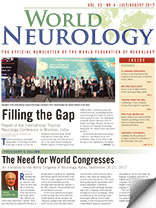By William P. Howlett, Marieke Dekker, and Sarah Urasa (KCMC)
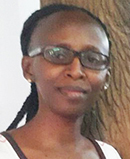
Sarah Urasa
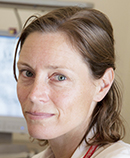
Marieke Dekker
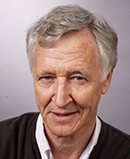
William P. Howlett
In August 2015, the African Academy of Neurology (AfAN) was formed in Dakar, Senegal, and became the final regional member of the World Federation of Neurology (WFN). This membership is proving to be an important stimulus to neurology education and training in Africa.
A subsequent meeting of AfAN and regional members of the WFN, which took place at the World Congress of Neurology in November 2015 in Santiago, Chile, adopted a resolution to promote the training of 200 neurologists in Africa within the following 10 years.
Since then, in order to achieve this goal, a number of initiatives have taken place in Africa. One such initiative involves the East African Development Bank (EADB), an organization that currently includes four countries: Kenya, Rwanda, Tanzania, and Uganda. It involves funding a Medical Training and Fellowship (METAF) program, which is designed to support the neglected fields of neurology and oncology in East Africa.
The neurology program includes support for one- to two-year training fellowships in the U.K. for African neurology trainees and support for local training in neurology within East Africa.
Partnership
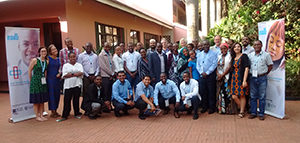
Group photo of course trainees, lecturers, and organizers.
The METAF program is planned in collaboration with local organizing partners and involves teaching hospitals and universities in East Africa and the Royal College of Physicians London (RCP) supported by representatives from the Association of British Neurologists (ABN) and managed by the British Council. Postgraduate doctors either training in internal medicine or pediatrics, or those recently graduated, are their target audience. The aim is to increase knowledge and awareness of neurology in Africa and to promote training in neurology, ranging from primary care to specialist neurologists.
To facilitate the implementation of METAF locally, adjacent countries—Tanzania/Kenya and Uganda/Rwanda—were paired into two groups with a series of two five-day courses planned per year, alternating between the host countries within each group. The setup was planned to continue for four years. Members of the teaching faculty for each course are chosen from the two host countries, with visiting lecturers from
the U.K.
The first series of these courses took place in September 2016 in Nairobi, Kenya, and Kampala, Uganda. A total of 34 trainees participated. The third course took place April 3-7 in Moshi in Northern Tanzania. It was attended by 20 trainees.
Practical Neurology Theme
The venue in Moshi was a local hotel with conference facilities. The theme of the Moshi course was “Practical Neurology,” with a comprehensive but practical review of the main neurological disorders experienced in Africa occurring in all ages. It also included a hands-on neurological examination. The course started and finished with a short pre- and post-training assessment. The covered topics ranged from infections— including HIV—to epilepsy, stroke, paraplegia, neuropathy, movement disorders, dementia, head injury, cerebral palsy, and genetic diseases. Interspersed between formal lectures were teaching video sessions and case presentations by the participants.
The course highlighted some important aspects for future neurology training in Africa. First, it is a practical example of a global AfAN/WFN initiative, which is funded from within Africa, supporting sustainability in the longer term. Second, it has resulted in North/South collaboration with neurologists/lecturers from within Africa and the U.K. coming together for the first time, all with the aim of teaching and training neurology in Africa. Third, the importance of participatory teaching methodology was underlined by the shared interest and excitement shown by the trainees, in particular with their case presentations and group discussions.
Ophthalmoscopy Exams
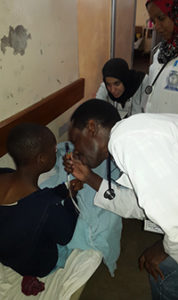
Trainee using an Arclight ophthalmoscope in the workplace.
An example of instant success was the provision of an affordable, handy, lightweight, easily rechargeable Arclight Ophthalmoscope free to everyone in the course, including teachers. This was introduced by David Nicholl, ABN honorary secretary. The candidates in the course were instructed on how to use the Arclight. The effect was palpably electric as they started to learn a practical skill and realized they could carry out funduscopic examinations upon returning to their workplaces across Tanzania.
The course is just one of a number of ongoing initiatives aimed at developing neurology training in Africa. In the past five years, the Eastern African region has seen some significant developments, with adult and pediatric neurologists from the East African Community (EAC) countries of Burundi, Kenya, Rwanda, Tanzania, and Uganda joining forces professionally. The aim is to facilitate specialist neurology training for EAC doctors within Africa to make the region less dependent on external training facilities. This was supported by grants-in-aid from the WFN.
Tanzania has a population of 53 million and only seven practicing neurologists, and has huge unmet needs in neurology. One author (Dr. Howlett) has worked at Kilimanjaro Christian Medical Center (KCMC) in Northern Tanzania for over 30 years. He has experienced the start of neurology teaching/training of assistant medical officers followed by undergraduates, later postgraduates, and the training of one specialist in neurology. The same changes are happening all over Africa today. The historical post-colonial gap in neurology teaching/training and skills in Africa is well known; this neurology teaching course is another small step toward closing that gap.
The authors are with the Kilimanjaro Christian Medical Center.
